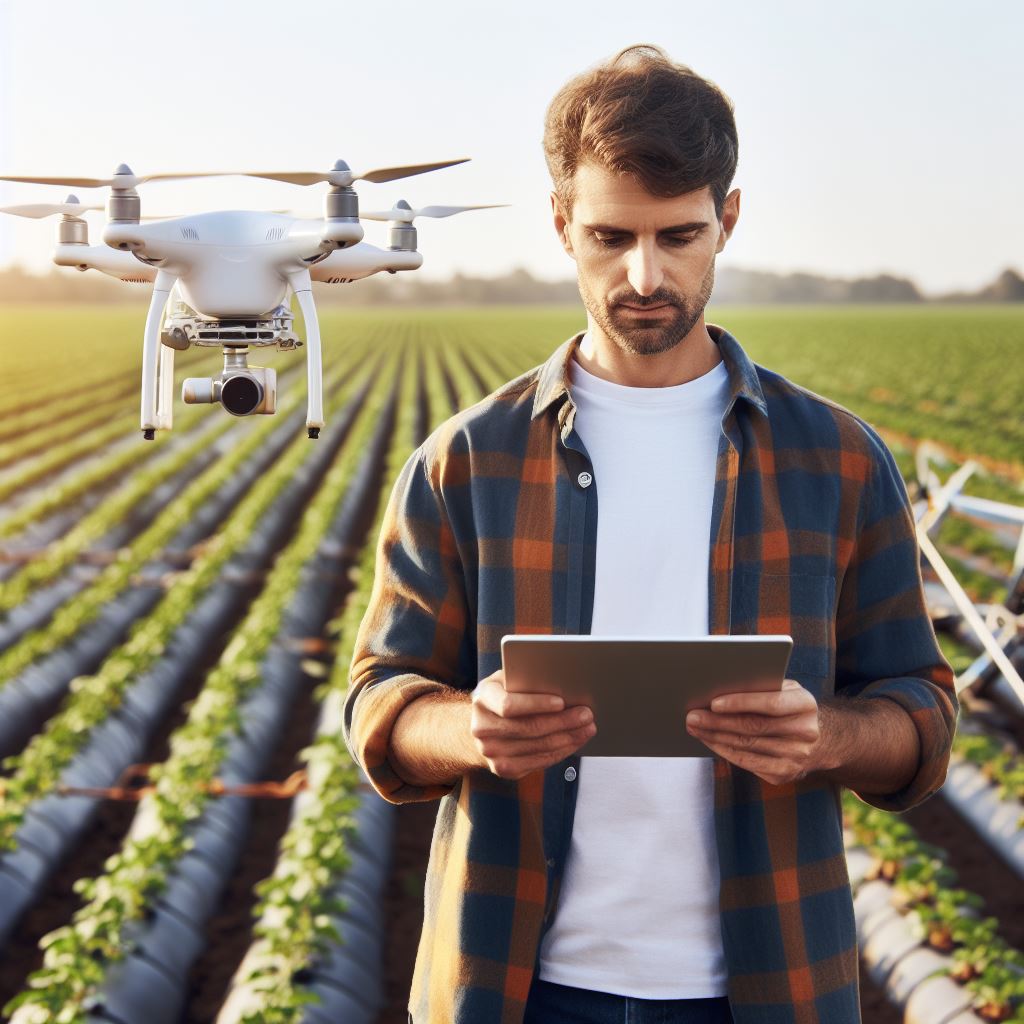Introduction
Definition of sustainability
Sustainability refers to the practice of utilizing resources in a way that meets the current needs without compromising their availability for future generations.
Importance of sustainability in agriculture
Sustainable agriculture ensures the long-term viability of the farming industry by minimizing environmental impact, conserving resources, and maintaining profitability.
Brief overview of the role of agricultural engineers in promoting sustainability on US farms
Agricultural engineers play a crucial role in implementing innovative technologies and practices that enhance sustainability in various aspects of farming operations.
These professionals work towards optimizing irrigation systems to reduce water wastage and enhance water-use efficiency on farms.
They develop precision farming techniques that enable site-specific nutrient management, minimizing the use of fertilizers and preventing nutrient runoff.
Agricultural engineers also design and implement energy-efficient machinery and equipment, reducing the carbon footprint of farm operations.
They strive to integrate renewable energy sources, such as solar panels and wind turbines, into agricultural systems to reduce reliance on fossil fuels.
Furthermore, these engineers focus on designing sustainable waste management systems, including composting and biogas production, to minimize environmental pollution.
Through research and development, agricultural engineers continually seek to enhance sustainable farming methods, making agriculture more efficient and environmentally friendly.
Overall, the role of agricultural engineers is integral in shaping US farms towards a more sustainable future, ensuring the longevity of the agricultural industry.
Role of Agricultural Engineers
Agricultural engineers play a crucial role in shaping and improving US farms through their expertise in applying engineering principles to agricultural practices.
Explanation of what agricultural engineers do
Agricultural engineers combine their knowledge of engineering and agricultural sciences to design and develop innovative solutions for agricultural problems.
They utilize technology and machinery to optimize farming practices, increase productivity, and minimize environmental impact.
These professionals work closely with farmers, agronomists, and other specialists to understand the needs and challenges of the agricultural industry.
They apply their technical skills to design, develop, and implement efficient systems and processes in various areas of agriculture.
Importance of their role in shaping US farms
The role of agricultural engineers in shaping US farms is of utmost significance in achieving sustainable and profitable agricultural practices.
Their contributions positively impact the entire farming community and the environment as a whole.
By incorporating engineering principles into agriculture, these engineers help farmers optimize the use of resources such as land, water, and energy.
This enables farmers to produce higher yields while minimizing waste and reducing their environmental footprint.
Agricultural engineers also play a vital role in ensuring food safety and security.
They develop systems and machinery that enhance food processing and packaging, ensuring that the final products meet quality standards and fulfill consumer demands.
Examples of tasks and projects undertaken by agricultural engineers
Agricultural engineers are involved in a diverse range of tasks and projects aimed at improving agricultural practices.
Some examples include:
- Designing efficient irrigation systems to optimally distribute water resources and reduce water wastage.
- Developing precision farming technologies, such as GPS-guided machinery and automated monitoring systems, to enhance crop management and reduce chemical usage.
- Creating and implementing sustainable waste management systems to minimize the environmental impact of agricultural byproducts.
- Designing and improving machinery and equipment for harvesting, planting, and processing crops, increasing efficiency and reducing labor requirements.
- Working on projects related to renewable energy sources, such as developing biofuel production systems and integrating solar power into farming operations.
- Conducting research to identify and implement cost-effective and environmentally friendly pest control methods.
These examples highlight the diverse range of tasks undertaken by agricultural engineers, all aimed at improving the efficiency, sustainability, and profitability of US farms.
Basically, agricultural engineers play a pivotal role in shaping US farms by utilizing their engineering expertise to address the specific needs and challenges of the agricultural industry.
Through their innovative solutions and collaboration with farmers, they contribute to sustainable farming practices, increased productivity, and environmental conservation.
Read: Financial Prospects of Animal Breeding in the USA
Transform Your Career Today
Unlock a personalized career strategy that drives real results. Get tailored advice and a roadmap designed just for you.
Start NowSustainable Farming Practices
Overview of sustainable farming practices
Sustainable farming practices are essential for the long-term success and health of agricultural systems. These practices prioritize environmental stewardship, social responsibility, and economic viability.
Various methods used in sustainable agriculture
Precision agriculture
Precision agriculture utilizes modern technology to optimize crop production and minimize resource usage. It involves using satellite imagery, GPS, and drones to precisely manage inputs such as fertilizers and irrigation.
Conservation tillage
Conservation tillage aims to reduce soil erosion and improve soil health by minimizing soil disturbance. Farmers use techniques like no-till or minimum tillage to maintain crop residues on the soil surface.
Organic farming
Organic farming avoids synthetic fertilizers, pesticides, and genetically modified organisms. It promotes biodiversity, soil fertility, and animal welfare while prohibiting the use of chemical inputs.
Water and energy conservation
Water and energy conservation practices in agriculture help minimize the industry’s environmental impact.
Methods like drip irrigation, efficient water storage, and use of renewable energy sources contribute to sustainability.
How agricultural engineers contribute to implementing and improving sustainable farming practices
Agricultural engineers play a vital role in advancing sustainable farming practices through their expertise in technology and innovation.
They design and develop precision agriculture tools and systems that enable farmers to optimize inputs, reduce waste, and increase efficiency.
Furthermore, these engineers work on developing and improving conservation tillage equipment to enhance soil health and reduce erosion.
Agricultural engineers also contribute to the success of organic farming by researching alternative pest management methods and designing organic-certified machinery and structures.
Water and energy conservation techniques are also areas where agricultural engineers lend their expertise.
They design irrigation systems that minimize water loss and develop energy-efficient technologies for farming operations.
Additionally, agricultural engineers collaborate with farmers to gather data and analyze it to make informed decisions regarding sustainable practices.
They provide recommendations to improve farming efficiency and environmental performance.
By incorporating cutting-edge technology, agricultural engineers enable farmers to adopt sustainable practices that benefit both the environment and their financial well-being.
Read: Ethical Practices for Animal Breeders: US Standards

Technological Innovations in Ag Engineering
Introduction to technological advancements in agricultural engineering
Agricultural engineering has witnessed significant technological advancements over the years, transforming traditional farming practices into modern, efficient, and sustainable methods.
Role of technology in promoting sustainability
Technology plays a vital role in promoting sustainability in agriculture by enabling farmers to maximize productivity while minimizing environmental impact.
By leveraging innovative solutions, ag engineers strive to create a harmonious balance between agricultural production and ecological well-being.
Examples of technological innovations in ag engineering
Drones for crop monitoring and data collection
Drones have revolutionized the way farmers monitor and manage their crops.
Equipped with cameras and sensors, these unmanned aerial vehicles provide valuable data on plant health, pest infestations, and nutrient deficiencies.
By collecting precise information, farmers can make data-driven decisions to optimize yields while reducing the use of pesticides and fertilizers.
Automation and robotics in farming
The integration of automation and robotics has transformed farming operations by streamlining labor-intensive tasks and enhancing efficiency.
Robotic systems can autonomously perform activities such as seeding, planting, spraying, and harvesting, reducing labor costs and minimizing human errors.
Moreover, these technologies enable farmers to conserve resources, as they can precisely apply inputs based on real-time data, resulting in reduced waste and environmental impact.
Sensor technology for optimizing resource use
Sensors play a crucial role in optimizing resource use in agriculture. From soil moisture sensors to weather stations, these devices gather critical data to assist farmers in making informed decisions.
By monitoring soil conditions and weather patterns, farmers can determine the optimal time for irrigation, minimize water usage, and prevent over-application of fertilizers.
This not only conserves resources but also reduces environmental pollution by limiting nutrient runoff.
Technological innovations in ag engineering have transformed the agricultural landscape, paving the way for sustainable farming practices.
By harnessing the power of drones, automation, robotics, and sensor technology, farmers can improve productivity, reduce costs, and minimize their ecological footprint.
Transform Your Career Today
Unlock a personalized career strategy that drives real results. Get tailored advice and a roadmap designed just for you.
Start NowRead: Day in the Life: Following a US Animal Breeder
Delve into the Subject: Embracing Agri-tourism: A New Revenue for US Farmers
Challenges and Future Outlook
Overview of challenges faced by ag engineers in promoting sustainability
- Limited adoption: Ag engineers face the challenge of convincing farmers to adopt sustainable practices.
- Resistance to change: Farmers may resist adopting new technologies and techniques due to tradition or cost.
- Lack of awareness: Many farmers are unaware of the benefits of sustainable farming and the role of ag engineers.
- Balancing productivity and sustainability: Ag engineers must find ways to increase yields while minimizing environmental impact.
- Financial constraints: Implementing sustainable practices can require significant upfront investment, posing a challenge for farmers.
Discussion on potential solutions and improvements
- Education and outreach: Ag engineers can raise awareness among farmers about the benefits of sustainability.
- Collaboration: Engineers, farmers, and researchers should work together to develop practical, cost-effective solutions.
- Incentives: Governments and organizations should provide financial incentives to encourage farmers to adopt sustainable practices.
- Technological advancements: Ag engineers should continue developing innovative technologies that improve sustainability.
- Training programs: Offering training programs for farmers on sustainable practices can help overcome resistance to change.
Importance of continued research and development in agricultural engineering
- Addressing emerging challenges: Ag engineers need to stay ahead and develop solutions for new sustainability challenges.
- Improving existing methods: Research and development can lead to more efficient and sustainable agricultural practices.
- Enhancing productivity: Ag engineers can develop technologies to increase yields while minimizing resource use.
- Adapting to climate change: Ongoing research is crucial for developing strategies to mitigate and adapt to climate impacts.
- Promoting sustainable food systems: Research can help create more sustainable and resilient food production and distribution systems.
Ultimately, ag engineers face various challenges in promoting sustainability on US farms. These include limited adoption, resistance to change, and financial constraints.
However, by raising awareness, collaborating, and developing innovative solutions, these challenges can be addressed.
Continued research and development in agricultural engineering are vital for overcoming emerging challenges, improving existing methods, enhancing productivity, and promoting sustainable food systems.
With the collective efforts of ag engineers, farmers, and researchers, a more sustainable future for US farms can be achieved.
Read: Challenges Faced by Modern US Animal Breeders
Conclusion
Recap of the role of agricultural engineers in shaping US farms through sustainability focus
Agricultural engineers play a crucial role in shaping US farms by promoting sustainable farming practices.
They utilize their expertise to design and implement innovative solutions that improve efficiency, reduce environmental impact, and ensure long-term viability of agricultural operations.
Final thoughts on the significance of sustainable farming practices and the contribution of ag engineers
The significance of sustainable farming practices cannot be overstated.
By adopting these practices, farmers can safeguard natural resources, increase productivity, and protect the health of the surrounding ecosystems.
Agricultural engineers are instrumental in driving this transformation by providing technical knowledge and practical solutions.
Call to action for readers to support and embrace sustainable agriculture
It is imperative for us as consumers and citizens to support and embrace sustainable agriculture. By choosing locally sourced and organic products, we can encourage farmers to adopt sustainable practices.
Additionally, advocating for policies that promote sustainable farming and investing in agricultural research can further drive positive change.
Together, we can ensure the long-term sustainability of our food systems, protect the environment, and promote the well-being of future generations.
Let us join hands and support the efforts of agricultural engineers in shaping a more sustainable future for US farms.




